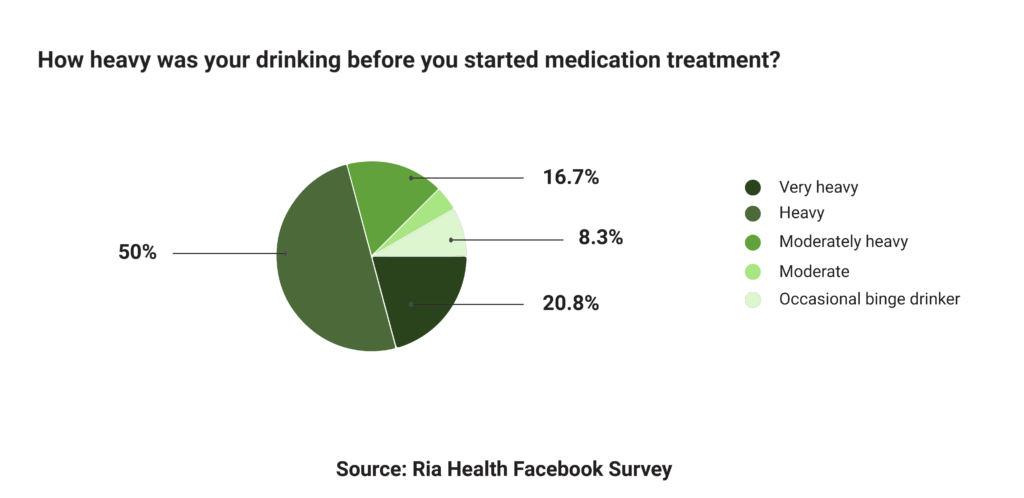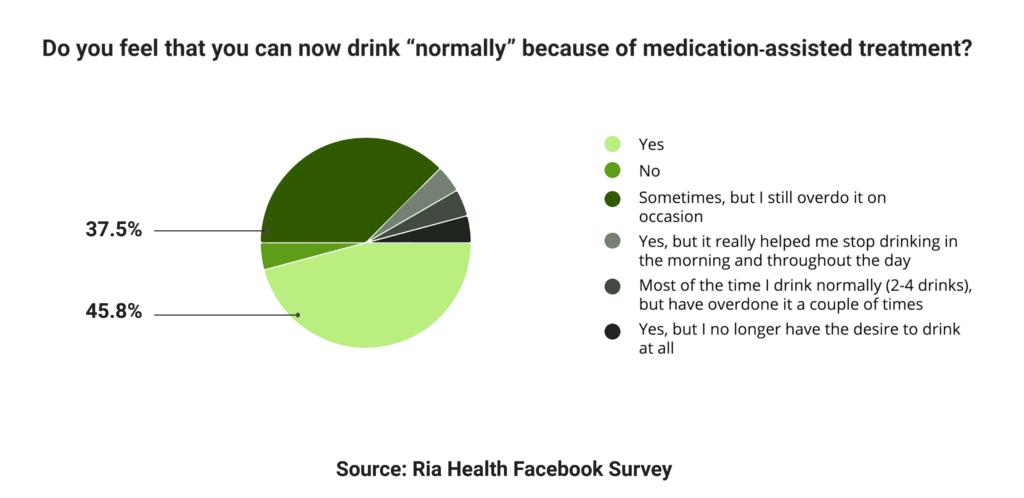Can An Alcoholic Ever Drink Normally Again?
It’s often thought that those who struggle with alcoholism can never return to a normal pattern of drinking. Even one drink, the theory goes, and an alcoholic will spiral into a dangerous pattern of excessive alcohol consumption.
This isn’t always the case, however. While mainstream alcohol addiction treatment generally still requires abstinence, there are also effective medication-based alternatives that can help people relearn to drink moderately.
This is potentially good news for millions of people. After all, abstinence-based programs don’t work for everyone, and there are many “gray area” drinkers who’d like to cut back without quitting completely. But the big question remains: Does moderation actually work? Can you actually relearn moderation after abstinence from alcohol? Can an alcoholic ever drink normally?
According to research, the answer is yes. It turns out that, with the right treatment plan, some alcoholics can recover and return to drinking normally again.
Surveying “Problem Drinkers”
Recently, we surveyed Facebook users who consider themselves “problem drinkers” about the effectiveness of alternative, medication-assisted treatment. We asked questions about their history with alcohol, their experience with medication treatment, and how their relationship with alcohol has changed since then.
Of the 24 survey respondents, 87 percent considered themselves very heavy, heavy, or moderately heavy drinkers prior to medication treatment. 70 percent of respondents said they had struggled with alcohol for 10 or more years.
After medication treatment, nearly 46 percent said that they can now drink normally. An additional 37 percent said they could sometimes drink normally, but might still overdo it on occasion. Only one of the 24 respondents felt they could not yet drink normally.


Most of the individuals we surveyed had tried more traditional treatment options before turning to medication-based solutions. Here’s how they described those experiences:
- “White knuckling didn’t work for me.”
- “I couldn’t do it. I would only last a day or two before giving in.”
- “I failed each and every time.”
- “I tried sober challenges—drinking only on the weekends, or stopping after the first bottle of wine. While the time constraints were helpful and I could do it, I would always be anticipating when I could drink again and would binge right after.”
For these individuals, medication-assisted treatment was a game changer, allowing them to finally establish a different relationship with alcohol.
What Is Medication-Assisted Treatment (MAT)?
Medication-assisted treatment is a method of treating substance use disorders through a combination of medication, counseling, and behavioral therapy. This approach looks at the entire individual, seeking to address both the biological and behavioral aspects of addiction.
Although medication alone sometimes helps to reduce drinking, it is often most effective in combination with therapy and counseling.
What Medications Are Used To Treat Alcohol Use Disorder?
The three most commonly used medications for alcohol use disorder are naltrexone, disulfiram, and acamprosate. Of these three medications, naltrexone is the best option for people seeking to limit their drinking, versus abstaining completely.
Naltrexone
Naltrexone reduces your motivation to drink by blocking the euphoric effects of alcohol. The medication is non-addictive, and is often taken for periods of three months or more. Some people continue to take naltrexone in targeted doses indefinitely.
By preventing drinking from having any pleasurable effect, naltrexone effectively retrains your brain to crave alcohol less. As a result, many people who take the medication eventually lose interest in drinking. This makes moderate drinking possible for them—or even abstinence if they so choose.
Disulfiram
Disulfiram, also known by the brand name Antabuse, was the first medication approved for treating alcohol use disorder. It works by making people feel ill when they drink, and is intended for people who wish to abstain from alcohol completely.
Just ten minutes after drinking even a small amount of alcohol, most people who take disulfiram experience severe side effects—including chest pains, nausea, and vomiting. These side effects may last for an hour or longer, and can serve as a powerful deterrent. However, there are now gentler alternatives.
Acamprosate
Acamprosate is also intended for people who want to stop drinking altogether. Typically, people begin using acamprosate once they’ve completed detox from alcohol, to help them remain abstinent.
This medication works by restoring a chemical imbalance in the brain caused by chronic drinking. It has little effect if you’re still consuming alcohol. Once you’re abstinent, however, acamprosate can make a big difference in limiting cravings and drinking urges. It can therefore be a good choice for long-term maintenance and relapse prevention.
Other Options
Other emerging medication options include baclofen, topiramate, and gabapentin. These medications are considered “off-label”—meaning they were originally approved for a different purpose, but are considered safe for use in treating alcohol addiction. Each has its own strengths, and may prove a useful backup medication, or even a good first choice.
- Gabapentin can be helpful if you struggle with anxiety or insomnia, or if you experience negative side effects from naltrexone.
- Baclofen was first approved to treat muscle spasms, but has shown itself useful in reducing cravings for some people.
- Topiramate was developed to treat seizures and migraines, but has also shown itself very effective for treating alcohol addiction in clinical trials—at times performing better than naltrexone.
Learn more about Medication for Alcoholism
Success Stories: Medication-Assisted Treatment Works!
For many people—including most of our survey respondents—medication-assisted treatment opens the door to a better, healthier relationship with alcohol. In answering some of our additional questions, many respondents gave glowing endorsements of how MAT has changed their lives, and helped them overcome problem drinking.
Here are some of their responses (some answers edited for clarity):
What is the biggest change you’ve seen in your relationship to alcohol?
- “I have no more cravings and obsessive thoughts about drinking. I can have one or two and then stop.”
- “I no longer even think about alcohol or crave it.”
- “Drinking doesn’t control me anymore.”
- “I’m setting a drink limit and sticking to it. I’m admitting I have a genuine problem, but instead of feeling shame, I feel like I’m taking control of it.”
- “Alcohol is no longer a regular part of my life. I don’t obsess or even think about drinking/not drinking anymore, which is huge. I can have a single beer or a glass of wine and feel satisfied—something I had never experienced before.”
- “I’m not obsessed and can stop after a glass or two. I no longer need to have alcohol in the house and don’t get triggered when I see alcohol. I have no issue being the designated driver on a night out. This never happened before. In the past, I would rather stay home than go out without drinking.”
Is there anything more you’d like to say about your experience with medication treatment for alcohol use disorder?
- “It has absolutely, positively changed my life for the better! I am so thankful that I stumbled upon it and decided to give it a try.”
- “I am forever grateful.”
- “My husband trusts me. My children trust me with the grandkids. No more sloppy, drunken nights. I’m 41 weeks in.”
- “It works!”
- “It has been a true miracle. I hardly recognize my own life now that my drinking is under control.”
- “It has been miraculous! I wish everyone was aware of medication treatment.”
- “Medication treatment is giving me hope.”
- “I am confident that my unhealthy alcohol use is a thing of the past and I am thriving in my life! So grateful that I found this method!”
- “You need to be ready and fully committed. You need to give it time. It isn’t a quick fix. Help yourself by logging and charting. Joining an online group is extremely supportive and helpful… It’s not a miracle fix, but it makes it a lot easier.”
- “An era has come to an end.”
- “It has changed (saved) my life. I will be forever grateful.”
As all these responses can attest, medication-assisted treatment is an effective alternative to traditional alcohol rehab for many people. If Alcoholics Anonymous, 12 step programs, and other mainstream methods haven’t worked for you, MAT may be the answer you’ve been looking for. It may even help you to drink normally again.
Medication-Assisted Treatment With Ria Health
Not only can medication-assisted treatment help you reset your relationship with alcohol, it’s now as close as your smartphone. Ria Health’s program offers all of the components of medication-assisted treatment through a convenient app. Our members get access to expert medical care, medications for alcoholism, one-on-one support, and tools to measure their progress—all on their own schedule. Best of all, we’re seeing strong results so far.
In the words of our Chief Medical Officer, Dr. John Mendelson:
“Drinking that has a low risk of harm should be below 14 standard units for women and 21 for men per week. People who drink at that level seem to have fewer acute problems (such as falls, injuries, fights, and DUIs), as well as dramatically reduced long-term consequences of alcohol. It’s gratifying when we can get a patient who had been drinking at quantities that guarantee health problems back down to that level in a very short period of time.”
If you’re looking for an effective, alternative approach to alcohol treatment, we’re here whenever you need us. Learn more about how our program works, or sign up for a call today.

Will insurance cover treatment? Verify Coverage
Have Questions? Call (800) 504-5360



